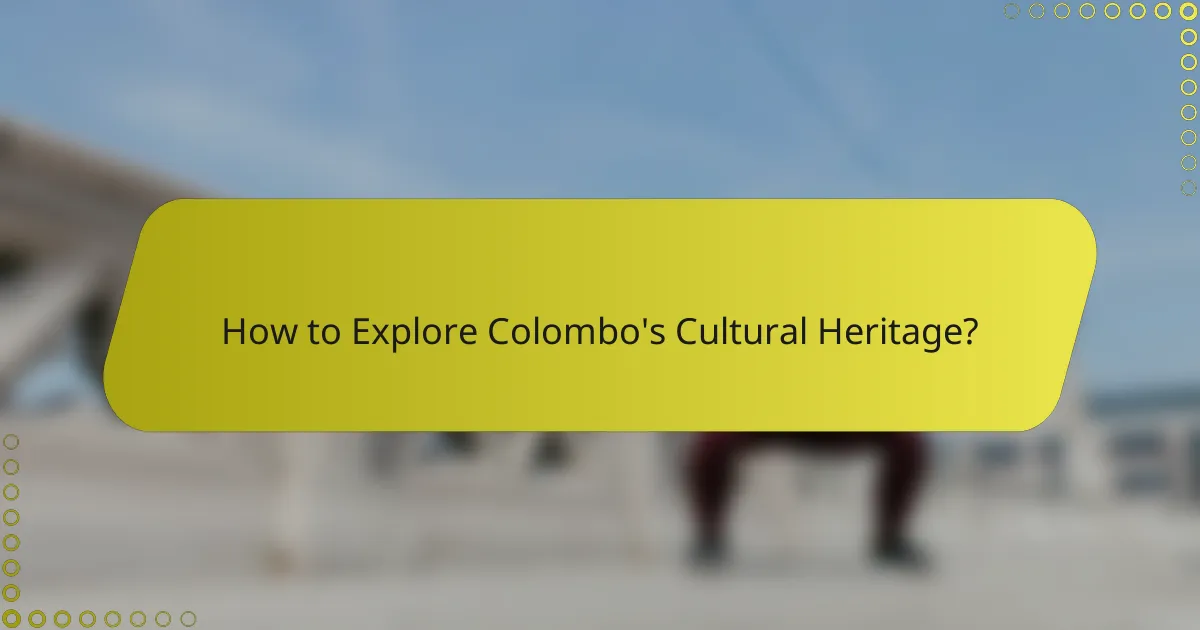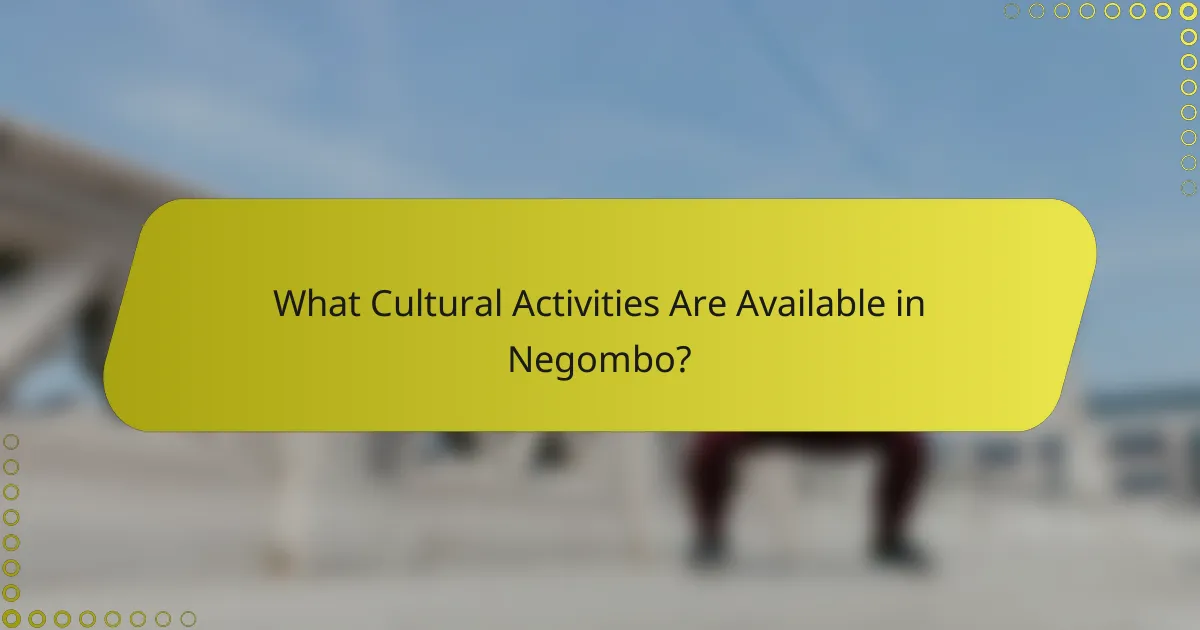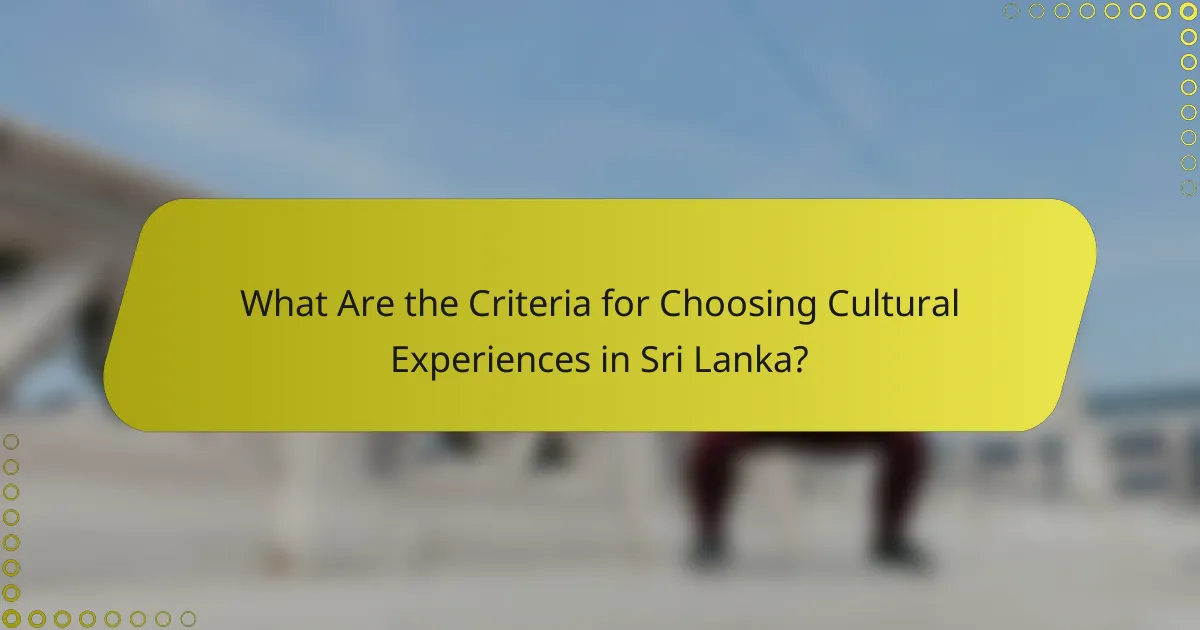Sri Lanka is a treasure trove of unique cultural experiences, with each city offering its own distinct charm. From the historical significance of Galle to the vibrant streets of Colombo, and the rich heritage of Kandy, visitors can immerse themselves in the island’s diverse traditions. Jaffna and Negombo further enhance this cultural journey, showcasing local customs and culinary delights that reflect the heart of Sri Lankan life.

What Unique Cultural Experiences Can You Find in Galle?
Galle offers a rich tapestry of cultural experiences that reflect its historical significance and vibrant local traditions. Visitors can immerse themselves in the unique blend of colonial heritage and contemporary Sri Lankan culture through various activities and attractions.
Galle Fort historical tours
Galle Fort, a UNESCO World Heritage site, is a must-visit for history enthusiasts. Guided tours often explore the fort’s well-preserved architecture, including the iconic lighthouse and bastions, while narrating stories from the Portuguese, Dutch, and British colonial eras.
Consider taking a walking tour that lasts around two hours, allowing you to appreciate the fort’s layout and historical significance. Many local guides offer insights into the fort’s past, making the experience both educational and engaging.
Local artisan workshops
Engaging with local artisans in Galle provides a unique opportunity to learn about traditional crafts. Workshops often focus on skills such as pottery, lace-making, and wood carving, allowing participants to create their own souvenirs.
These workshops typically last a few hours and are suitable for all skill levels. Look for sessions that include hands-on activities, as they often enhance the learning experience and foster a deeper appreciation for local craftsmanship.
Traditional Sri Lankan cuisine experiences
Sampling traditional Sri Lankan cuisine is essential when visiting Galle. Culinary experiences often include cooking classes where participants learn to prepare local dishes like rice and curry, hoppers, and sambols.
Classes usually last around three to four hours and may include a market visit to source fresh ingredients. Be sure to try local restaurants that offer authentic dishes, as they provide a taste of the region’s rich culinary heritage.

How to Explore Colombo’s Cultural Heritage?
To explore Colombo’s cultural heritage, immerse yourself in its rich history through museums, vibrant street food, and contemporary art. Engaging with local experiences will provide a deeper understanding of the city’s diverse traditions and artistic expressions.
Colombo National Museum visits
The Colombo National Museum is the largest museum in Sri Lanka and a key destination for understanding the nation’s history and culture. Visitors can explore extensive collections, including ancient artifacts, royal regalia, and exhibits showcasing the island’s colonial past.
Plan your visit during weekdays to avoid crowds, and consider joining a guided tour for in-depth insights. Admission fees are typically modest, making it an accessible option for all travelers.
Street food tours in Pettah
Pettah is renowned for its bustling street food scene, offering a variety of local delicacies that reflect Colombo’s culinary diversity. Joining a guided street food tour can enhance your experience, allowing you to sample dishes like kottu roti, hoppers, and fresh seafood.
Be sure to try popular stalls and vendors known for their quality and hygiene. A budget of around 1,000 to 2,000 LKR should suffice for a satisfying meal and snacks during your tour.
Art galleries and exhibitions
Colombo boasts a vibrant art scene, with numerous galleries showcasing both contemporary and traditional Sri Lankan art. Notable venues include the Lionel Wendt Art Centre and the Sapumal Foundation, where you can view exhibitions from local and international artists.
Check gallery schedules for openings and events, as many host regular exhibitions and workshops. Admission is often free, making it an excellent way to engage with the local art community without a significant financial commitment.

What Cultural Attractions Are in Kandy?
Kandy is rich in cultural attractions that reflect Sri Lanka’s heritage and traditions. Key highlights include the Temple of the Tooth Relic, vibrant cultural dance performances, and the stunning Botanical Gardens.
Temple of the Tooth Relic tours
The Temple of the Tooth Relic, or Sri Dalada Maligawa, is one of the most significant Buddhist sites in the world. It houses a tooth relic of the Buddha, making it a pilgrimage destination for many. Tours typically include a guided visit to the temple, where you can learn about its history and significance.
Visitors should plan their visit around the daily rituals, which occur in the morning and evening, providing a unique glimpse into Buddhist practices. Dress modestly and be respectful, as this is a sacred site.
Cultural dance performances
Kandy is famous for its traditional cultural dance performances, which showcase the island’s rich heritage. These performances often feature elaborate costumes and intricate choreography, reflecting various regional styles. The most popular venue for these shows is the Kandy Cultural Centre.
Attending a performance is a great way to experience Sri Lankan culture firsthand. Shows typically last around an hour and are held in the evenings, making it easy to fit into your itinerary.
Botanical Gardens exploration
The Royal Botanical Gardens in Peradeniya, just outside Kandy, is a must-visit for nature lovers. Spanning over 147 acres, the gardens boast a diverse collection of flora, including orchids, palms, and medicinal plants. The gardens are well-maintained and offer a peaceful escape from the city.
While exploring, look for the famous giant Javan fig tree and the impressive avenue of royal palms. Guided tours are available, but you can also wander at your own pace. Consider visiting early in the morning to avoid crowds and enjoy the tranquility of the gardens.

How to Experience Jaffna’s Unique Culture?
To experience Jaffna’s unique culture, immerse yourself in its rich history, vibrant festivals, and distinctive culinary traditions. Engaging with local communities and participating in cultural events will provide a deeper understanding of this northern Sri Lankan city.
Jaffna Fort historical visits
Jaffna Fort, built in the 17th century by the Portuguese and later expanded by the Dutch, is a key historical site. Visitors can explore its well-preserved ramparts, bastions, and the scenic views of the surrounding area. Guided tours often provide insights into the fort’s strategic importance and its role in local history.
When visiting, consider timing your trip to coincide with the early morning or late afternoon for cooler temperatures and fewer crowds. Entry is typically free, but donations to local preservation efforts are appreciated.
Local festivals and traditions
Jaffna is known for its vibrant festivals, such as the Nallur Kandaswamy Kovil festival, which attracts thousands of devotees and tourists. This event features colorful processions, traditional music, and dance performances, showcasing the region’s cultural heritage.
Participating in local traditions, such as the Tamil New Year celebrations, offers a unique glimpse into the community’s customs. Engaging with locals during these festivities can enhance your experience and provide opportunities to learn about their beliefs and practices.
Traditional Jaffna cuisine
Jaffna’s cuisine is characterized by its use of fresh seafood, spices, and unique cooking methods. Signature dishes include Jaffna crab curry, mutton curry, and a variety of vegetarian options that highlight local produce. Don’t miss trying the traditional rice and curry meals served on banana leaves, which are both flavorful and visually appealing.
For an authentic experience, visit local eateries or markets where you can taste homemade dishes. Be open to trying street food, but ensure it’s from reputable vendors to avoid any health issues. Engaging with local chefs or participating in cooking classes can also deepen your appreciation for Jaffna’s culinary traditions.

What Cultural Activities Are Available in Negombo?
Negombo offers a variety of cultural activities that reflect its rich heritage and coastal lifestyle. Visitors can engage in fishing village tours, enjoy boat rides on the lagoon, and explore vibrant local markets, each providing a unique glimpse into the local way of life.
Fishing village tours
Fishing village tours in Negombo allow visitors to experience the traditional fishing practices that have shaped the community. These tours typically include visits to local fishermen’s homes, where you can learn about their daily routines and the types of fish they catch.
During the tour, you may have the opportunity to participate in fishing activities or observe the colorful fishing boats and nets. It’s a great way to appreciate the cultural significance of fishing in Negombo and support local livelihoods.
Negombo Lagoon boat rides
Boat rides on Negombo Lagoon provide a serene way to explore the area’s natural beauty and wildlife. These rides often last from one to two hours and can be arranged through local operators who offer guided tours.
As you navigate the lagoon, keep an eye out for various bird species and the lush mangroves that line the shores. Sunset boat rides are particularly popular, offering stunning views and a peaceful atmosphere.
Local market experiences
Exploring local markets in Negombo is a must for anyone wanting to immerse themselves in the local culture. The main market is bustling with vendors selling fresh seafood, fruits, vegetables, and spices, providing a sensory overload of sights and smells.
When visiting, try to engage with the vendors and sample local delicacies. Early morning is the best time to visit for the freshest produce and a lively atmosphere. Be prepared to negotiate prices, as haggling is common practice in these markets.

What Are the Criteria for Choosing Cultural Experiences in Sri Lanka?
Choosing cultural experiences in Sri Lanka involves assessing authenticity, accessibility, and the depth of engagement with local traditions. Prioritizing genuine interactions with local communities enhances the overall experience and understanding of the rich cultural tapestry of the country.
Authenticity of experiences
Authenticity is crucial when selecting cultural experiences in Sri Lanka. Look for opportunities that allow direct interaction with local communities, such as participating in traditional cooking classes or attending local festivals. These experiences often provide deeper insights into the customs and lifestyles of Sri Lankan people.
Consider visiting less commercialized areas like Jaffna or Kandy, where you can engage with local artisans and witness traditional crafts. Authentic experiences often come from smaller, family-run businesses rather than large tour operators, which may prioritize profit over genuine cultural exchange.
To ensure authenticity, research reviews and seek recommendations from travelers who emphasize local experiences. Avoid overly touristy attractions that may dilute the cultural significance, and instead, opt for immersive activities that reflect the true essence of Sri Lankan culture.


